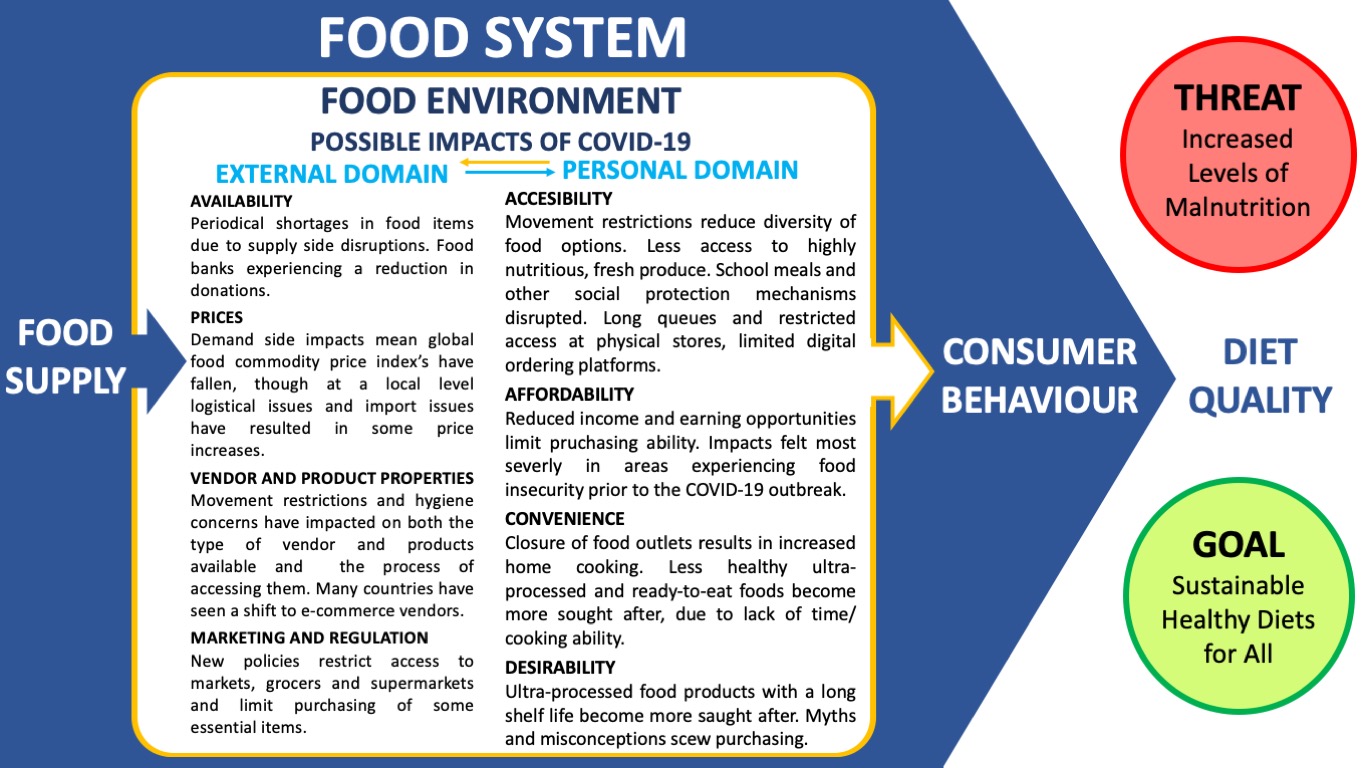For more than two months now, the world has been living in semi-confinement and the world’s economy moving in slow motion due to the global COVID-19 pandemic. Both the disease and the measures that are taken to reduce its spread cause disturbances and disruptions in day-to-day food supply mechanisms, which are increasingly felt at all levels. An increase of at least 150 000 child deaths is estimated due to the indirect impacts of COVID-19 in health service delivery and childhood undernutrition[1]. Prior to the COVID-19 pandemic, 135 million people experienced crisis level of acute food insecurity and COVID-19 and related restrictions risk pushing many more into acute hunger (FSIN 2020)[2].
As the pandemic spreads, the points of interaction between people and the food system – their food environments - are changing rapidly and taking on greater importance in everyday life. Lockdowns, policy responses, and COVID-19 itself have the potential to impact on both external and personal food environments, detailed in figure 1.

Figure 1. Possible impacts of the COVID-19 pandemic on food environments
Consequences range from undernutrition to overweight/ obesity and diet-related non-communicable diseases (NCDs). The role of unhealthy diets has been further heightened during the pandemic given people with NCDs are more vulnerable to becoming severely ill and to die from COVID-19.[3]
But what does the evidence tell us is actually happening in practice? Much of the reporting and action related to COVID-19s impact on food environments focuses on external domains which lie largely outside of people’s sphere of influence. To better understand how people are experiencing and adapting to these changes within the personal domains of their food environment, UNSCN conducted an online survey from 15 to 30 April 2020[4] . Convenience sampling was employed which utilized UNSCN’s existing communication networks.
In total 2006 people from 108 countries, in primarily urban settings, responded. Most of them are female (70%) and around half between 25 and 44 years of age. Half of them are working or studying in nutrition, education, government, and health services. Most respondents were from Western Europe and North America (46%), followed by the Asia-Pacific Group (excluding China where surveys in Google forms are prohibited) (30%). Respondents from Africa (15%), Latin America and Caribbean (8%) and from Eastern Europe (1%) were less numerous.
Preliminary results show that survey respondents’ food accessibility altered noticeably and food related daily routines were the most disrupted, after work and social related activities. With strict rules placed on people's personal movement to limit the spread of COVID-19 this is not surprising.
Among food related behavior changes related to food desirability and convenience, 2 out of 3 respondents indicated an increase in food stockpiling, likely linked to the finding that nearly half of all respondents report buying more food out of anxiety. In addition, the large majority of responses indicated facing important accessibility changes at the point of purchase. This included restricted access (81%), physical distancing measures (91%), as well as the availability of information on protective measures (89%) and responsible purchasing (70%) at the point of sale.
Home cooking seems to be the big winner of the crisis with 50% of the respondents indicating an increase in the practice, with the correspondent decrease in eating out, either in restaurants/cafeterias/bars our at family and friend’s places. Among the survey respondents, home cooking and food stockpiling seems to be accompanied by increased awareness of food waste (66%) and the promising indication that this awareness means food is not being wasted more than normally (93%). While the survey did not directly seek information on affordability of food this is an important and sensitive domain as many people around the world are facing increased food insecurity because of reduced income and earning potential. The impacts are most prominent in areas that were already facing food insecurity before the outbreak of COVID-19. Despite the surveys bias with responses from largely higher income countries 8% of respondents reported relying on social protection measures such as food banks, while 17% are relying on alternative sources of food such as personal and community food production.
So what can we learn from this? COVID-19 related changes in food environments reveal the weaknesses in the system and the need for more resilience and sustainability. While great, the current challenges create opportunities. Faced with uncertainties and anxiety, people are searching for direction and reassurances in their food environments. Heightened awareness about our food environments and the foods we consume create a catalyst for change.
[1] https://www.thelancet.com/journals/langlo/article/PIIS2214-109X(20)30229-1/fulltext
[2] GRFC 2020. Global Report on Food Crisis 2020. Available at : https://docs.wfp.org/api/documents/WFP-0000114546/download/?_ga=2.126964110.221321867.1589466142-2144737428.1589466142
[3] WHO, 2020. Information note on COVID-19 and NCDs. Available at: https://www.who.int/who-documents-detail/covid-19-and-ncds

